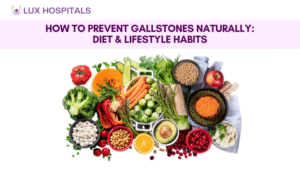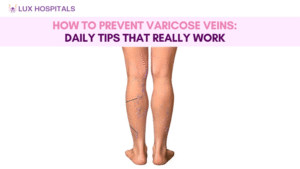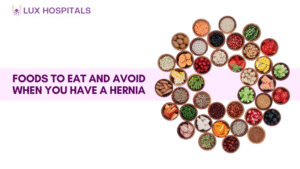Why Fatty Foods Hurt: Gallbladder Pain & Symptoms Explained

Have you ever indulged in a greasy burger or a cheesy pizza only to be met with a sharp, nagging discomfort in your upper abdomen shortly after? If so, you’re not alone and your body might be trying to tell you something important about your gallbladder health. For many, gallbladder pain and discomfort after consuming fatty foods can signal underlying issues that shouldn’t be ignored.
Let’s explore why fatty food can cause pain and what it reveals about your gallbladder symptoms and overall health.
The Gallbladder’s Role in Digestion
A tiny, pear-shaped organ nestled beneath the liver is called the gallbladder. Its primary function is to hold and release bile, an intestinal fluid that helps the breakdown of lipids. When you eat fatty food, your gallbladder contracts, releasing bile into your small intestine to aid digestion.
But this process can go haywire if your gallbladder isn’t functioning properly. Instead of digesting smoothly, you might experience gallbladder pain after eating, especially meals high in fat.
Why Fatty Foods Hurt: The Gallbladder Connection
When the gallbladder is irritated, blocked, or diseased, its normal function is compromised. Fatty meals become a trigger. Here’s why:
- Gallstones: Hardened deposits that block the bile ducts, leading to sharp gallbladder pain.
- Cholecystitis: gallstones, which frequently cause gallbladder inflammation.
- Sluggish Gallbladder (Biliary Dyskinesia): A condition where the gallbladder doesn’t empty efficiently.
- Gallbladder sludge: Thickened bile that can irritate the gallbladder lining.
If your body struggles to process fatty food, you may experience bloating, nausea, and persistent discomfort classic gallbladder symptoms.
Recognizing Gallbladder Symptoms
Gallbladder symptoms often go unnoticed or are mistaken for general indigestion. However, when explicitly tied to fat intake, they become more telling. Common signs include:
- Sharp, stabbing gallbladder pain in the upper right abdomen
- Pain radiating to your back or right shoulder blade
- Bloating and fullness, especially after fatty meals
- Nausea or vomiting
- Burping or gas
- Fever or chills (in more serious cases)
Women are statistically more prone to gallbladder issues, making gallbladder women’s health a vital area of awareness.
Gallbladder Pain After Eating: A Red Flag
Gallbladder pain after eating greasy or rich foods isn’t just uncomfortable—it could be a red flag. This pain typically begins 30 minutes to an hour after eating and may last from minutes to several hours. If this sounds familiar, it’s important not to brush it off.
Certain fatty foods to avoid with gallbladder problems include:
- Fried foods
- Processed meats
- Full-fat dairy products
- Butter and creamy sauces
- Pastries and baked goods made with lard or shortening
Eliminating or minimizing these items can ease symptoms and support better gallbladder health.
How Is Gallbladder Pain Diagnosed?
If you’re experiencing consistent gallbladder pain, a healthcare provider can help identify the root cause. Diagnosis typically involves:
- Physical exam and medical history
- Ultrasound imaging to detect gallstones
- HIDA scan to assess gallbladder function
- Blood testing to look for inflammation or infection symptoms
Gallbladder Pain Treatment Options
The severity of your illness affects how you will be treated. Common approaches include:
- Dietary changes to reduce fat intake
- Medication to manage pain or dissolve gallstones (in select cases)
- Minimally invasive surgery (laparoscopic cholecystectomy) to remove the gallbladder if needed
Surgery is often recommended if gallbladder pain is frequent and severely affecting your quality of life. The procedure is safe and widely performed with a short recovery time.
How to Support Gallbladder Health?
Prevention is always better than cure. Here are some simple ways to support your gallbladder health:
- Maintain a healthy weight
- Avoid rapid weight loss or crash diets.
- Eat small, balanced meals.
- Limit fried, greasy, or high-fat foods.
- Stay hydrated and active.
Listening to your body, especially when it reacts negatively to food, can help prevent bigger issues.
When to See a Doctor?
If you’re experiencing persistent or severe gallbladder pain, especially after eating, it’s time to consult a healthcare provider. Warning signs include:
- Fever or chills
- Jaundice (yellowing of the skin or eyes)
- Pain lasting more than a few hours
- Vomiting without stopping
Conclusion
Gallbladder pain isn’t something to overlook—mainly if meals high in fat are the cause. Although fatty foods might be a tasty treat, they can also reveal more serious gallbladder problems. You may effectively manage symptoms and protect your long-term gallbladder health by paying attention to your body and getting care when you need it.
If you’re experiencing pain or discomfort after eating, especially fatty meals, don’t wait. Contact the team at Lux Hospitals for expert guidance and personalized care.
Frequently Asked Questions
Pain after eating fatty food may indicate a problem with your gallbladder health. The gallbladder releases bile to help digest fat, and if it’s inflamed, blocked, or not functioning well, you might experience gallbladder pain shortly after meals.
Gallbladder pain is often triggered by fatty foods, especially fried or greasy meals. These foods encourage the discharge of bile from the gallbladder. Pain and discomfort can result if bile flow is blocked (such as by gallstones).
If you have gallbladder problems, avoid fried foods, processed meats, full-fat dairy, and baked goods with lard. These can trigger gallbladder pain and worsen symptoms.
Yes. Women, especially those over 40 or with a history of pregnancy or hormone therapy, are more likely to develop gallbladder symptoms. This makes gallbladder women’s health a critical early detection and prevention focus.
Yes, gallbladder pain can sometimes be managed without surgery through a low-fat diet, medications, and lifestyle changes. But if the symptoms are severe or chronic, surgery might be required.



















